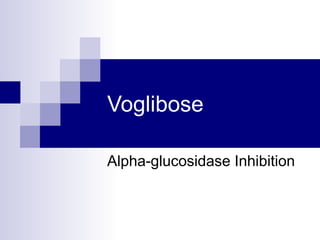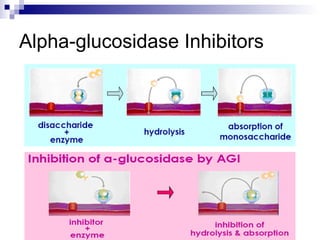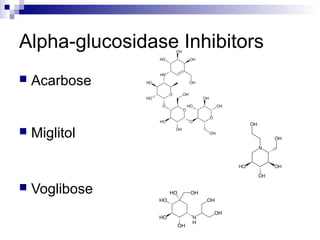Voglibose
- 4. Alpha-glucosidase Inhibitors α-Glucosidase inhibitors (AGI) are anti- hyperglycemic agents that, by blockade of oligosaccharide catabolism, 1. Delay (in small doses) or 2. inhibit (in larger doses) carbohydrate digestion and absorption, and, thus inhibit/ maintain smooth and lower blood glucose levels after a meal. Current consensus supports their use as monotherapy or adjunct therapy for poorly controlled NIDDM.
- 5. Alpha-glucosidase Inhibitors Acarbose Miglitol Acarbose Voglibose Miglitol Voglibose
- 6. Alpha-glucosidase Inhibitors Work by preventing the digestion of carbohydrates Starch, table sugar Carbohydrates normally digest to create simple saccharides Absorbed in the intestines (small) Mechanism of action includes competitive inhibition of enzymes needed to digest carbohydrates Reduces rate of digestion of carbohydrates! Long-term effects include a small decrease in hemoglobinA1c levels
- 7. 7 Alpha-glucosidase Inhibitors Efficacy the enzyme α-glucosidase in the gut Inhibit Prevent conversion of complex CHO to simple CHO Thus, delay the absorption of CHO Hence, reduced PPBG excursions Very modest in efficacy, usually take 6-8 weeks Side Effects Flatulence or abdominal discomfort common No effect on lipids or blood pressure No weight gain or loss Contraindicated in IBD or Cirrhosis
- 8. Alpha-glucosidase Inhibitors Acarbose Miglitol & Voglibose postprandial hyperglycemia postprandial hyperglycemia Inhibits glycoside hydrolases Inhibit glycoside hydrolases glucosidase Taken at beginning of a meal Taken at beginning of a meal Miglitol is systemically Gastrointestinal side effects absorbed Common Excreted by the kidneys Higher efficacy than Voglibose Voglibose is newest: less side effects economical Miglitol Voglibose Acarbose
- 11. Alpha-glucosidase Inhibitors Indications Newly diagnosed patients insufficiently treated with diet and dominating postprandial hyperglycemia Elderly multimorbid patients Elderly patients with weight gain or hypoglycemia under treatment with insulin secretagogues Patients with hepatic or renal disorders
- 12. Advice to patients on AGIs Start low, go slow Prefer nutrients with complex carbohydrates (rice, pasta, full bread, vegetables, fruits) Avoid refined carbohydrates (sugar, sweets). Take only three meals Avoid laxatives, such as sugar alcohols (sorbitol) Control your postprandial blood glucose to experience the efficacy of treatment In most cases gastrointestinal side-effects are transient
- 13. Alpha-glucosidase Inhibitors AGIs have clear beneficial effects on glycemic control and postload insulin levels but not on plasma lipids. In patients with type 2 diabetes, alpha glucosidase inhibitors improve glycaemic control in studies of mainly 24 weeks’ duration. Data are lacking on the effects of alpha glucosidase inhibitors on mortality, diabetes related morbidity, and quality of life.













